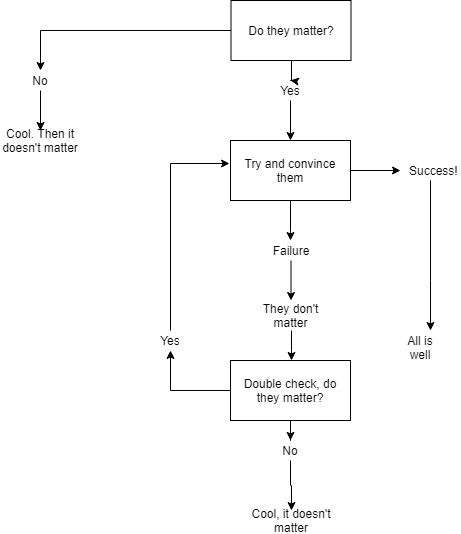Diffusing "I can't be that stupid"
Why does it hurt so much when I think that people I care about are very wrong about something I think is important? If I'm talking with someone I'm not super close with, I'm usually very capable of not getting emotional or riled up when we find important disagreements.
After some though, it seems like my mind is running a process similar to the one below.

Quick summary:
For some reason, I don't want to accept that someone can matter and be worthy of care, and still be (from what I know) very wrong about very important things. In order to work around this, I slightly dehumanize people when I think they're majorly wrong. When I think someone I care about is majorly wrong, I bounce around in a loop
I'd guess that the experience of pain and discomfort that comes from disagreeing with close ones about important things is produced by spending time stuck in the loop on the left.
I should note that it feels uncomfortable to say that the above process is one that I routinely use, primarily because of how obviously broken it is upon reflection. You'd never catch me audibly saying, or even explicitly thinking, "Dante doesn't matter/isn't human because he doesn't agree with me."
There was a non-trivial delay between when I first thought I could be doing some sort of dehumanization, and when I seriously considered it as a possibility. I don't like how long that took. I think bugs like this can often be hard to deal with because there's a sense of, "There's no way I could be that stupid."
Sometimes it seems like the mechanism is, "I would feel bad if I turned out to be 'that stupid', and I don't want to feel bad, so I'm not going to consider it." But it seems like there's also plenty of instances where it's, "I genuinely assign a low probability to being 'that stupid', and so I'm not going to investigate it."
When I queried this belief, I found something like, "Given that I am capable of feats of great intelligence, all parts of me should be very intelligent, because that's how intelligent things work[citation not need because I'm an implicit belief]." Which again, when I say it out loud I can see right through that.
Hmmmm... wait, so is my conclusion just that you should pay attention to your beliefs, and then ask, "Why do you believe what you believe?"
It sure is :)
Process to Apply This Post
- Work on noticing the feeling of, "I can't be that stupid."
- Fully describe the behavior that you thing you "aren't stupid" enough to be doing.
- Grill the validity of the belief that you "aren't that stupid".
- Work on correcting the behavior.
- Profit